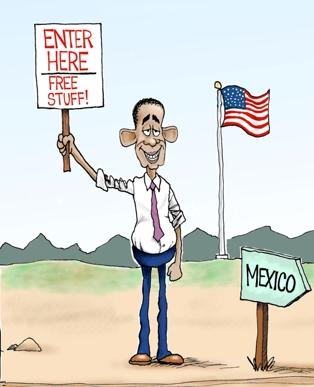“[T]he Obama Administration’s lackeys at Attorney General Loretta Lynch’s Justice Department are doing everything in their power to allow their new illegal alien power base to vote.”
That was Americans for Limited Government President Rick Manning’s reaction to the Department of Justice’s decision not to defend the Election Assistance Commission in the case League of Women Voters v. Newby. The Commission had provided that the federal voter registration form would include Alabama, Georgia and Kansas requirements to enforce their respective state proof-of-citizenship voter registration laws.
The Justice Department, which is supposed to defend the Commission, actually consented to the filed injunction against the Commission. Sounds like the Commission needs new representation.
Fortunately, the Election Law Center’s Christian Adams and Kansas Secretary of State Kris Kobach were at court to argue the case on behalf of the Commission even as the Justice Department refused to do so.
While most people don’t pay attention to who their secretary of state is, this case proves that having a good one like Kansas’ Kobach can make all the difference
Judge Richard Leon allowed Adams and Kobach to argue against the injunction, telling those in attendance he had never seen the Justice Department concede a preliminary injunction before. No word yet on whether he will grant the injunction or not, but the fact he allowed Adams and Kobach to argue at all could be very telling.
The controversy began on Feb. 1 when an updated version of the federal voter registration form was posted on the Commission’s website that notes the states’ proof-of-citizenship requirements.
For Alabama the new federal form states, “To register in Alabama you must: be a citizen of the United States. The county board of registrars shall accept any completed application for registration, but an applicant shall not be registered until the applicant has provided satisfactory evidence of United States citizenship.”
For Georgia, “To register in Georgia you must: be a citizen of the United States… [and] be found eligible to vote by supplying satisfactory evidence of U.S. citizenship.”
For Kansas, “To register in Kansas you must: be a citizen of the United States… [and] have provided a document, or copy thereof, demonstrating United States citizenship within 90 days of filing the application with the secretary of state or applicable county election officer.”
In short, in accordance with those state laws, local officials must certify the citizenship of those registering to vote on the federal form. But there’s a catch.
Thanks to the 2013 Supreme Court ruling by the late Justice Antonin Scalia, Arizona v. Inter Tribal Council of Arizona, those states can only block registration of federal form applicants in cases where citizenship is not proven if those requirements are explicitly written on the federal form.
Consider that. What is written on the federal voter registration form by an independent commission can trump the validity of a state law requiring proof of eligibility to register to vote. Such that, if it’s written on the form, the applications can be blocked by the states without said proof, and if it’s not, they can’t.
For now, the state requirements are indeed written on the form.
But if the injunction is granted by Judge Leon and the new federal voter registration form is removed, then Alabama, Georgia and Kansas would have to begin processing federal applications to the state voter rolls once again even if there is no proof of citizenship.
This therefore is an attempt by the Justice Department to settle this case and invalidate the application of the states’ laws without even a fair hearing of including the state requirements on the federal form.
Fortunately, Judge Leon may be seeing through this façade. Time will tell. But clearly the stakes in the case could not be higher.
Correction: An earlier version of this article state Kris Kobach was the Kansas Attorney General. He is actually the Secretary of State.
Robert Romano is the senior editor of Americans for Limited Government.







